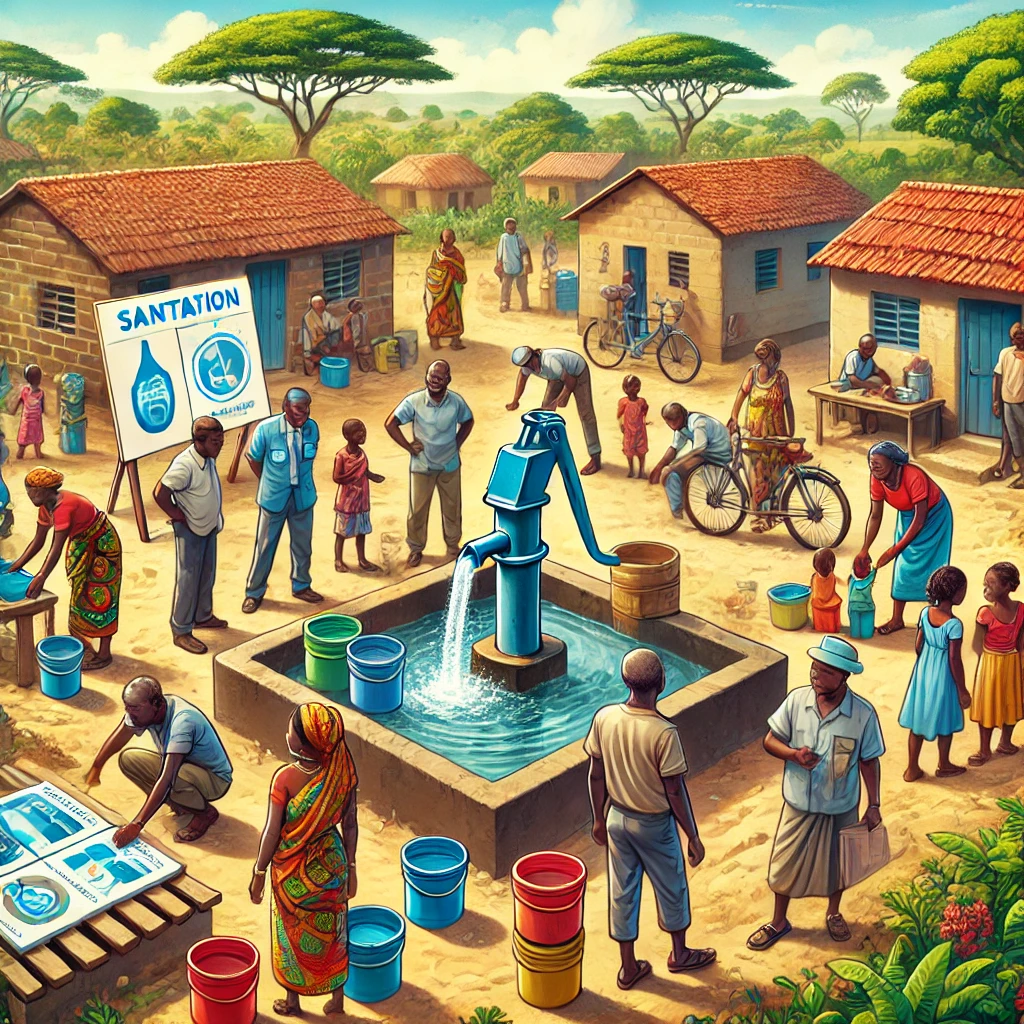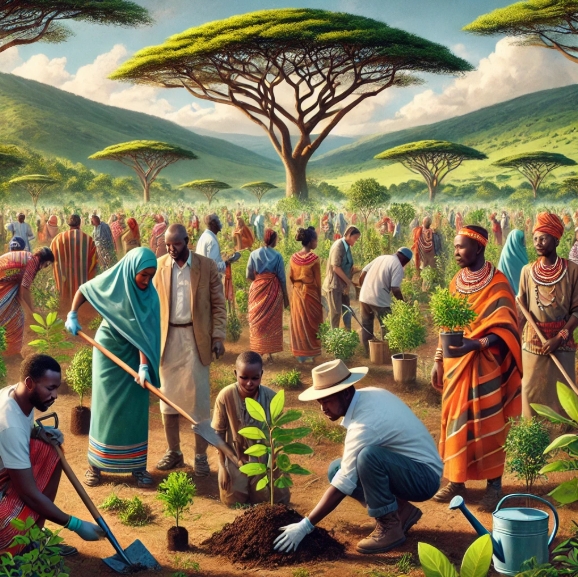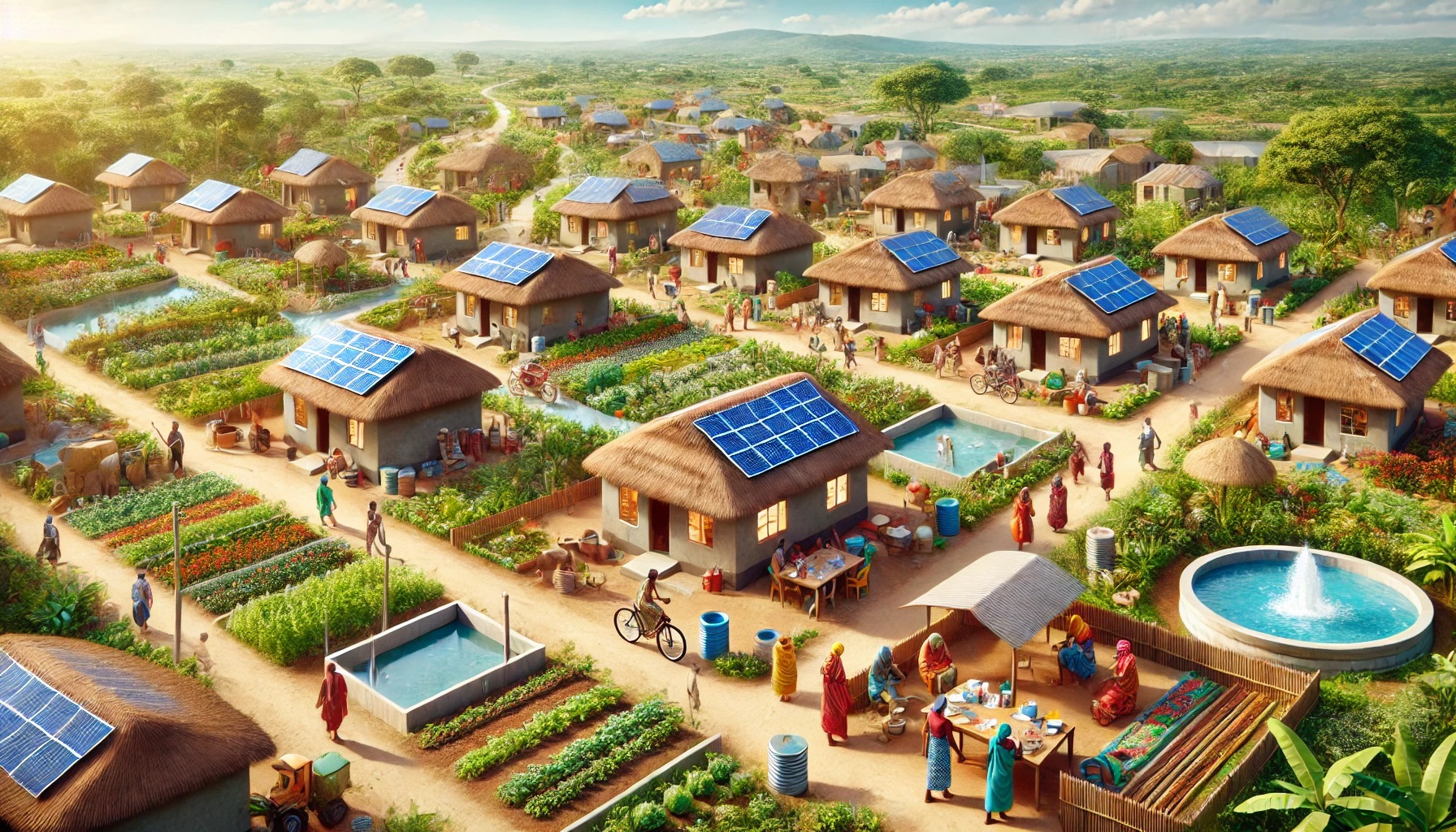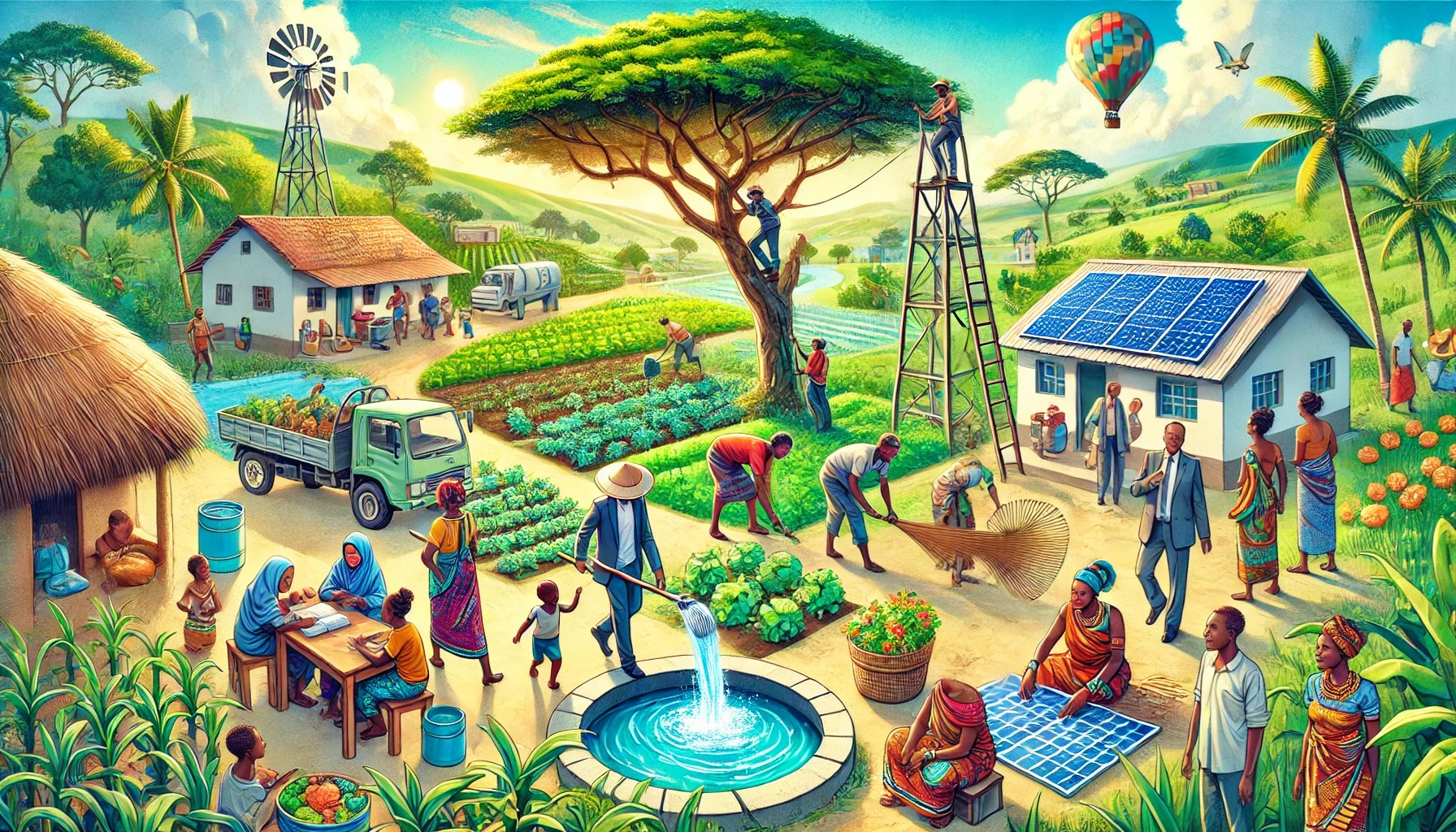OUR INITIATIVES
EDUCATION INITIATIVE

A heartwarming illustration of children in a simple school in a rural African setting. The classroom is made of basic materials such as wooden benches and a chalkboard. The children are happily engaging in learning activities, some holding books, others writing on small chalkboards. The environment reflects modest conditions, with sunlight streaming through windows made of wooden frames. The teacher, a caring adult, is standing by the chalkboard. The setting is surrounded by natural scenery, including trees visible through the windows.
Education plays a crucial role in fighting poverty in Africa by empowering individuals, improving economic opportunities, and promoting sustainable development. In many African countries, poverty is deeply entrenched, and access to education is limited, especially in rural areas. However, education can serve as the most effective tool to break this cycle of poverty.
First, education equips individuals with essential skills and knowledge, increasing their employability and earning potential. For example, children who receive a quality education are more likely to secure well-paying jobs, thus improving their standard of living and contributing to their community’s economic growth. Furthermore, educated individuals are more likely to start businesses, create jobs, and promote innovation, which fosters local economic development.
Moreover, education also has a significant impact on health outcomes, which is often linked to poverty. Educated individuals tend to make better decisions regarding nutrition, healthcare, and family planning, leading to improved health and well-being. This, in turn, reduces healthcare costs, increases productivity, and helps families escape poverty.
Additionally, when communities prioritize education, there is a generational shift. Educated parents are more likely to send their children to school, creating a cycle of knowledge and opportunity that continues for generations. This helps break the intergenerational transmission of poverty.
In conclusion, education is a powerful weapon in the fight against poverty in Africa. By providing access to quality education, individuals and communities can uplift themselves economically, improve their quality of life, and contribute to broader national development.
PROJECTS
AGRICULTURE INITIATIVE

Agriculture holds immense potential to alleviate poverty in Africa, where a significant portion of the population relies on farming for their livelihoods. As the backbone of most African economies, the agricultural sector can drive economic growth, enhance food security, and create employment opportunities, contributing to poverty reduction.
One of the primary ways agriculture alleviates poverty is by providing a steady source of income. Smallholder farmers, who make up the majority of Africa’s agricultural workforce, can increase their earnings through improved farming practices, access to better seeds, and investment in irrigation. Enhancing productivity not only ensures food availability for households but also creates surpluses that can be sold in local and international markets.
Agriculture also promotes food security, a critical factor in reducing poverty. Malnutrition and hunger are prevalent issues in many parts of Africa, limiting people’s ability to work and learn effectively. A robust agricultural sector ensures an abundant supply of nutritious food, improving health outcomes and enabling communities to break free from poverty cycles.
Furthermore, agriculture stimulates economic activity in related industries, such as food processing, storage, and transportation. These activities create jobs along the value chain, particularly in rural areas, where employment opportunities are often limited.
By investing in agricultural innovation, infrastructure, and education, African nations can empower farmers to harness the full potential of the land. Modern techniques, sustainable farming practices, and market access can transform agriculture into a powerful tool for economic development, ultimately lifting millions out of poverty.
PROJECTS
WATER & SANITATION INITIATIVE

A water and sanitation activity in Africa, highlighting community efforts to alleviate poverty.
Access to clean water and proper sanitation is crucial for alleviating poverty in Africa. Millions of people on the continent still lack these basic necessities, which not only affects their health but also perpetuates poverty cycles. Improving water and sanitation infrastructure can significantly enhance quality of life, boost economic productivity, and reduce poverty.
Health is directly tied to water and sanitation. Contaminated water and poor sanitation are leading causes of diseases like cholera, diarrhea, and typhoid, which disproportionately affect children and vulnerable populations. These illnesses drain family resources through healthcare costs and lost income, keeping many in poverty. By ensuring access to clean water and safe sanitation, communities can prevent these diseases, allowing individuals to lead healthier, more productive lives.
In addition, access to water saves time, particularly for women and girls who often bear the burden of fetching water. In rural Africa, many spend hours daily walking long distances to collect water, time that could otherwise be used for education or income-generating activities. Providing accessible water sources can empower women and girls, leading to improved education outcomes and greater gender equality.
Water and sanitation also underpin economic development. Access to reliable water sources supports agriculture, the backbone of many African economies, while improved sanitation reduces environmental degradation, ensuring sustainable resource use.
In conclusion, investing in water and sanitation is a critical step in breaking poverty cycles in Africa. It promotes health, enhances productivity, and creates opportunities for education and economic growth, laying the foundation for a brighter, more equitable future.
PROJECTS
ENVIRONMENTAL CONSERVATION INITIATIVE

An illustration of an environmental conservation activity in Kenya, featuring tree planting in a community effort.
Environmental conservation plays a vital role in alleviating poverty in Africa by safeguarding the natural resources upon which millions depend for their livelihoods. The continent’s economy is largely reliant on agriculture, forestry, and fishing, all of which are directly affected by environmental degradation. When ecosystems are preserved, they provide essential services such as clean water, fertile soil, and biodiversity, which sustain livelihoods and promote food security.
Deforestation, soil erosion, and desertification are pressing challenges in Africa, often exacerbated by poverty-driven exploitation of resources. Conservation initiatives, such as reforestation programs and sustainable agricultural practices, help reverse these trends. By restoring degraded lands, communities can increase agricultural productivity and reduce the need to encroach on forests for farming, thus creating a cycle of sustainable development.
Additionally, conservation projects often introduce income-generating opportunities, such as ecotourism, which provides jobs while preserving wildlife and natural landscapes. Countries like Kenya and South Africa have successfully leveraged their rich biodiversity to attract tourists, generating revenue for local communities. Similarly, renewable energy projects, such as solar and wind farms, promote environmental sustainability while creating employment and reducing energy poverty.
Investing in environmental conservation also mitigates the impacts of climate change, which disproportionately affects the poor. By building climate resilience through sustainable practices, communities are better equipped to cope with extreme weather events, thus protecting their livelihoods and reducing vulnerability to poverty.
In conclusion, environmental conservation is not just an ecological necessity but a critical strategy for alleviating poverty in Africa. Sustainable management of natural resources ensures long-term economic growth and resilience, fostering a healthier and more prosperous future for all.
PROJECTS
HOUSING & SETTLEMENT INITIATIVE

An illustration depicting how housing and settlement activities can help alleviate poverty in rural Africa. It highlights sustainable housing, solar energy, access to education, healthcare, and farming activities, promoting community empowerment and economic growth.
Housing and settlement conditions in rural Africa are often characterized by inadequate infrastructure, limited access to basic services, and poor construction materials. Most rural homes are made from mud, thatch, or wood, which lack durability and insulation. Poor housing contributes to health issues, limits productivity, and perpetuates poverty. However, improving housing and settlement in rural areas can play a significant role in poverty alleviation.
Adequate housing provides a foundation for better health outcomes. Improved homes with proper ventilation, sanitation, and roofing reduce the prevalence of diseases such as respiratory infections and malaria. Healthier families are more productive and spend less on medical expenses, allowing them to invest in education, farming, or small businesses.
Access to essential services in settlements, such as clean water, electricity, and roads, can transform rural economies. Infrastructure development not only enhances the quality of life but also facilitates trade, education, and access to healthcare. Electrification enables productive activities like food preservation and small-scale manufacturing, while better roads connect rural producers to markets, increasing their income potential.
Affordable and durable housing programs, combined with community-driven initiatives, can create jobs in construction and related sectors. Utilizing local materials and skills further stimulates the rural economy.
In conclusion, improving housing and settlement in rural Africa is not merely a matter of infrastructure but a pathway to breaking poverty cycles. By investing in sustainable housing and community development, governments and organizations can foster economic growth, health, and stability, creating a foundation for a prosperous future.
PROJECTS
POVERTY ALLEVIATION INITIATIVE

An illustration showcasing various activities that aid in alleviating poverty in rural Africa. It highlights agriculture, education, small businesses, access to clean water, renewable energy, healthcare, and trade—each contributing to community empowerment and development.
Poverty alleviation in Africa is a crucial aspect of fostering sustainable development across the continent. With over 40% of Sub-Saharan Africa’s population living below the poverty line, addressing this challenge requires a multifaceted approach that combines economic, social, and environmental strategies.
One key method of alleviating poverty lies in empowering rural communities through infrastructure development. Building affordable and sustainable housing can provide stability and improve living conditions, while access to clean water and sanitation reduces health risks, enabling communities to thrive. Investments in renewable energy, such as solar power, help bridge the energy gap, fostering small businesses and improving educational outcomes.
Agricultural development also plays a pivotal role in reducing poverty. Enhancing farming techniques, improving access to markets, and offering financial services, such as microloans, empower farmers to increase productivity and income. Diversifying rural economies by promoting small-scale industries and entrepreneurship can further reduce dependency on agriculture and create new job opportunities.
Education is a cornerstone of poverty alleviation. By ensuring equitable access to quality education, particularly for girls and marginalized groups, Africa can nurture a skilled workforce capable of driving economic transformation. Additionally, healthcare investments combat diseases that disproportionately affect impoverished communities, breaking the cycle of poverty.
Finally, robust governance and community involvement are essential. Transparent policies, inclusive decision-making, and support for grassroots initiatives ensure sustainable development tailored to local needs. By combining these efforts, Africa can create pathways to prosperity, uplifting millions from poverty and unlocking its full potential.
